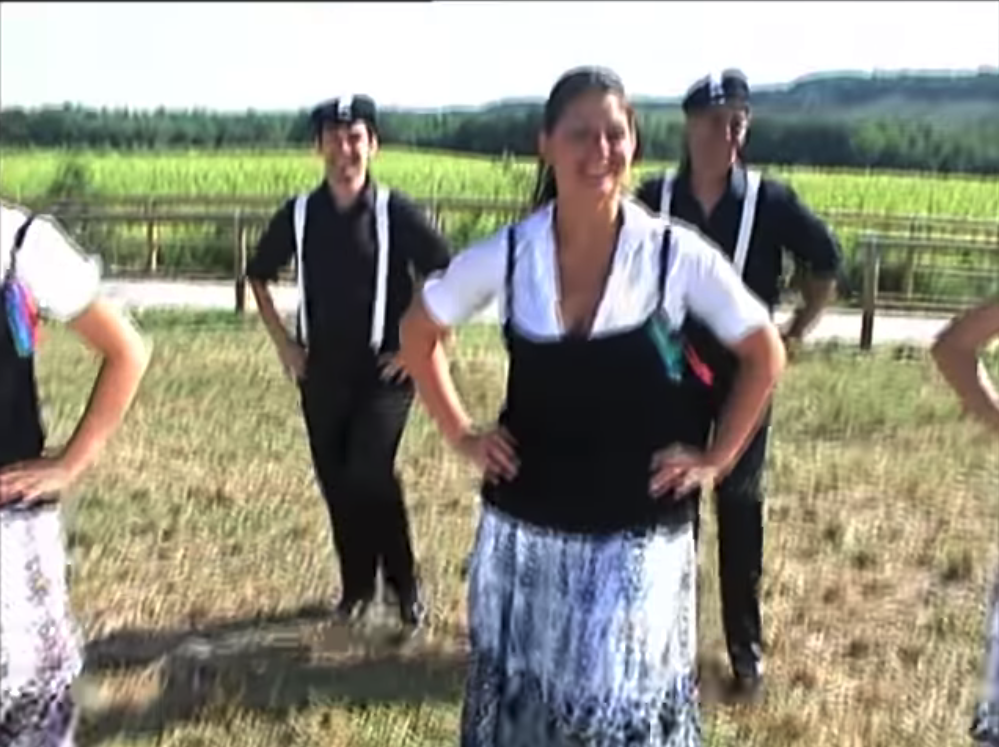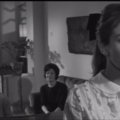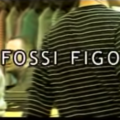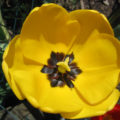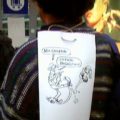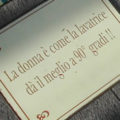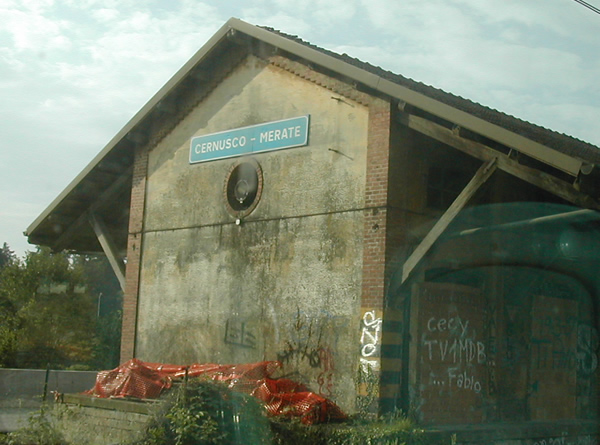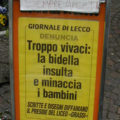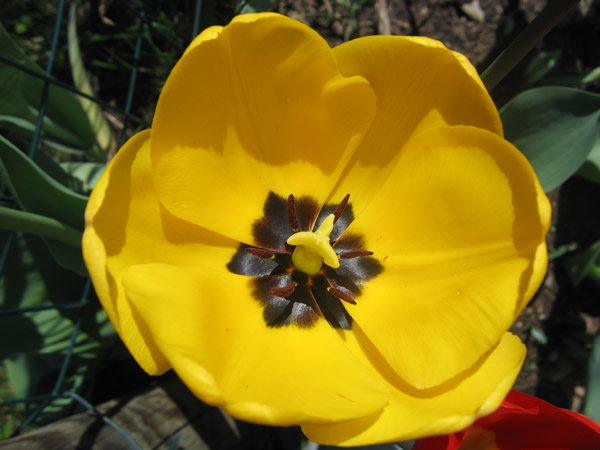I noticed people were looking for this on my site, so I discovered a cute new song. Singer/songwriter Roby Santini “the Country Boy” is obviously writing about his parents – they play themselves in the video. And apparently the family is from Pollutri, Provincia di Chieti, Abruzzo.
Tag Archives: Italian slang and idiom
Italian Animal Idioms
In Italian, as in any language, there are many popular sayings and metaphors using animals, based on human perceptions of those animals’ lives and habits.
Cats
It seems that, in Italian culture, the distinguishing feature of cats is their greed for food.
Non c’e’ trippa per gatti
“There’s no tripe for cats.”
This is used when there’s absolutely no hope that you’ll get what you want. I suppose tripe is considered something that cats would like, but humans (at least some Italians) also like it, and are not about to share it with mere felines. At the European football championships in Athens (spring 2007), a group of Italian Milan fans unfurled a banner saying (in English) “There’s no tripe for cats,” meaning that there was no hope for the other team to win, though probably only the Italians understood it that way.
Tanto va la gatta al lardo che ci lascia lo zampino
“The [female] cat goes so often to the lard that [sooner or later] she will leave her little paw [print] in it.”
In other words, the cat is so irresistibly attracted to the lard (to eat it), that sooner or later you will know exactly whom to blame: a habitual malefactor will eventually be caught. This reflects the fact that many criminals don’t seem to have much imagination, but keep exploiting the same formula over and over again, which makes it easier for the good guys to catch them.
Dogs
Dogs are known for not having easy lives. Which is certainly true in Italy – urban dogs become neurotic cooped up in tiny apartments, and when out for their walks are the targets of hatred from non-dog-owners, who know that most Italian dog owners will not clean up after their pets, rendering city streets disgusting and parks hazardous for children to play in.
Every year thousands of dogs (and cats) are abandoned on the roadsides by families who are going away for the usual long vacation and can’t think of anything better to do with them. At this time of year the newspapers are full of pious “moral campaigns” pointing out that this is hazardous to humans as well as cruel to the animals: lost dogs wandering onto highways cause traffic accidents.
It’s not surprising that in Italian, as in English, people refer to…
Una Vita da Cani
“A dogs’ life.”
Dirlo ai Cani e Porci
“Tell it to dogs and pigs.”
To broadcast something, probably someone’s personal news, to every possible listener, no matter how unlikely to be interested.
Birds
Conosco i miei polli – “I know my [own] chickens”. Used when you know someone so well that you can predict how they will behave in a given situation. My own speculations on the origin of this phrase.
I know I’m missing more animal idioms – feel free to add!
Italian SMS-Speak
“Texting” – sending text messages via cellphone – has been popular in Italy far longer than in the US, in part because it’s cheaper than calling. When I can’t reach someone by email, I use SMS for non-urgent communications – it’s less intrusive than a call, and I have a phobia of disturbing people.
Italian kids in particular text a lot, though many have now moved on to instant messaging on their computers. They’ve developed a shorthand which is useful for both; I give some examples here (and will expand on them as I run into new ones, particularly with illustrations).
The graffito on the side of the building pictured above reads: Cecy TV1MDB… Fabio.
TVB – ti voglio bene – “I love you” – predates cellphones; I remember my daughter and her middle school friends scribbling it on each others’ school diaries and backpacks. (The advertising applications for TVBLOB are instantly apparent.)
The graffito above is another variant: 1 is (obviously) uno, the number one, but it’s also the article “a” or “an”. So this reads: Ti voglio un mondo di bene – “I desire for you a world of good,” or “I love you a lot.”
Cecy, BTW, pronounced CHAY-chee, is a nickname for Cecilia [cheh-CHEE-lee-ah].
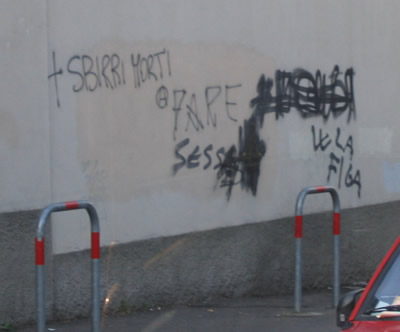
+ is of course the mathematical plus sign, pronounced piu’ [PYOO]. But piu’ also means “more”. So the ugly sentiment expressed above is “more cops dead.”
At the bottom right is the VV symbol meaning “hurray for!” – figa (cunt). (A rather pleasanter sentiment.)
Other Abbreviations
(For which I don’t yet have photos.)
6 – sei means “six” or “you are”.
cmq – comunque – anyway
k – The letter k is pronounced kappa in Italian (the name is Greek because k is not actually part of the Italian alphabet). But Italian kids, knowing that in English it’s pronounced [kay], use it as shorthand for -che, a common Italian syllable.
x – This is not the letter x, but the multiplication symbol, called per in Italian. The word per is also a preposition meaning “for”, and, again, a frequently-used syllable in Italian.
So: xk = perché – “why?” – a savings of four letters when entering text!
what are some more Italian SMS abbreviations I’m missing?
Italian Idiom and Sayings
Note: See the Italian slang section for stronger language (if you’re not easily offended…). Note: Some of the new phrases added here are rude!
Alla Come Viene, Viene
[To do something] sloppily, literally “it comes out as it comes out.”
Alla Meglio
[To do something] as best one can, in a hurry or under constraint, with the implication that this isn’t very good.
Attaccare il Cappello
“To hang up one’s hat” – used of a man who marries a wealthy woman, and (presumably) doesn’t have to work anymore.
Avere la Botte Piena e la Moglie Ubriaca
“To have the wine cask full and the wife drunk” – to have your cake and eat it, too.
In Bocca al Lupo
“Into the wolf’s mouth”. I don’t know why, but this is the phrase used instead of “Good luck” before an event, exam, etc., somewhat in the sense of “You never say ‘good luck’ on opening night” (instead you say “Break a leg”).
The proper response is Crepi il lupo (“May the wolf die” – which is to say: “I’m going into the wolf’s mouth, and may he choke on me.”)
A ruder version used nowadays is In culo alla balena – in the whale’s ass. I’m not sure whether the whale is also supposed to die.
Botte Piccola Fa Vino Buono
“A small cask makes good wine” – A friendly compliment to a short person.
Buona Notte al Secchio
Literally, “good night to the bucket”, it’s used to mean “…and then we’re screwed.” Why there should be a bucket involved I do not know.
Buono Come il Pane
“As good as bread.” A stock phrase typically used in situations when someone or something has unexpectedly behaved very badly, e.g. the Rottweiler who just killed a child, to its owner’s vast surprise: “He always seemed as good as bread!”
Caduto dalle Nuvole
“Fallen from the clouds” – Completely taken by surprise, or pretending to be.
Capita a Fagiolo
“Occurs at the bean” – happens at exactly the right moment. This derives from a time when beans were an essential and common part of the diet of many poor Italians, so to capitare a fagiolo was to turn up just in time for a (probably much-needed) meal.
Casino
[cah-ZEEN-o] A mess. Can also be used figuratively: Siamo incasinati – “We’re in a mess” (or “we’re very busy”). This one is okay for polite company. Can also be used like “a lot”: Mi piace un casino – “I like it a lot.”
Chi Me Lo Fa Fare?
Literally, “Who makes me do it?” Used as “Why should I do it?”
Comandare é meglio che fottere
A Sicilian proverb (which I cannot render in the original Sicilian) meaning “It is better to command than to fuck.” In other words, the pleasures of power are even greater than the pleasures of sex. Though, in reality, the two are usually closely intertwined.
Dalle Stelle alle Stalle
“[To go] from the stars to the [horse] stalls” – to fall from grace. I’m not sure whether this was originally used in the opposite form, about someone who’d had a meteoric career, but it seems I’ve heard it more often used this way.
Dente Avvelenato
Every now and then I stumble across a phrase I can’t easily translate from Italian into English, or vice-versa. Those are usually the most interesting ones, from a cultural point of view. Friends asked my opinion of the Italian school system; my reply began: C’ho il dente avvelenato. Literally, “I have a poison tooth,” this phrase implies: “When I speak on this topic, be aware that I am foaming-at-the-mouth furious about it, and anything I say is colored by that.”
Dio Ce Ne Scampi
May God make us avoid it
– i.e., “God forbid
.”
Dio li Fa, poi li Accoppia
“God makes them, then he mates them.” Said of any couple or pair who seem destined to be together by reason of sheer eccentricity.
Fuori (di Testa)
[FWOR-ee di testa] Out (of your) mind. Sometimes used in the phrase fuori come un balcone – “out[side] like a balcony” – crazy as a loon (or whatever equivalent English expression for extreme craziness.
Guai
[GWAH-ee] Troubles. Siamo nei guai – “We’re in trouble(s).”
Metterci il Cappello
To put one’s hat on (top of) – to falsely claim ownership of or credit for.
Modestamente Parlando
“Speaking modestly” or, in more colloquial English, “in all modesty…” Usually used ironically.
Most famously used by the Neapolitan actor Toto’: Signori si nasce. E io, modestamente parlando, lo nacqui.
“One is born a lord [gentleman]. And I, in all modesty, was born one.”
Occhio Scuro e Cappello Biondo é il Piu’ Bello del Mondo
“Dark eyes and blonde hair are the most beautiful in the world.” Well, of course, I agree!
Parlare Fuori dai Denti
“To speak outside of one’s teeth” – to say openly what’s on your mind. I suppose this is the opposite of speaking through clenched teeth, as you tend to do when restraining yourself from saying what you really think.
Peli Sulla Lingua
Literally, “hairs on the tongue.” Usually used in the negative form: “He doesn’t have hairs on his tongue,” meaning that he speaks plainly (perhaps even viciously), without flattery. I suppose the idea is that having hairs on your tongue would make your tongue less harsh, but – ick! Who would want hairs on their tongue anyway?
Peli Sulla Pancia
Literally, “hairs on the stomach.” Again, usually used in the negative form: not having hairs on one’s stomach means to be tough, able to stand up to criticism.
Piove sul Bagnato
“It rains on what’s [already] wet” – too much of a good thing.
Sposa Bagnata, Sposa Fortunata
“A wet bride [is a] lucky bride.” What you say to console her when it rains on her wedding day!
Ti Amo vs. Ti Voglio Bene
Two different ways to say “I love you” in Italian.
Tira piu’ un pelo di figa che un carro di buoi
“A cunt hair pulls [attracts] more than an oxcart.” In other words, the power of sex overcomes all other forces!
“Every Death of a Pope”
Apr 3, 2005
Italians have (at least) two sayings related to the deaths of popes. One is the phrase ogni morte di papa – “every death of a pope,” used for rare events, much like the English “once in a blue moon.”
The other is Morto un papa, se ne fa un’altro – “one pope dies, they make another.” Which shows just how blasé Italians are about popes and the workings of the Vatican. It is widely believed in Italy that the pope who preceded John Paul II was murdered (after only a month in office) because he showed radically liberal tendencies. This cannot be proven: the Vatican is a sovereign state, so it can (and did) refuse the Italian police permission to autopsy.
But the Italians are making as much fuss as the rest of the world about the death of this particular pope (John Paul II). I found the papal deathwatch disgusting, about on a par with the Terry Schiavo* mess, and have ignored both as much as possible (which hasn’t been easy).
And that is all I’m going to say about it.
Note: See the Italian slang section for stronger language (if you’re not easily offended…).
What Italian sayings am I missing? Let me know!
Non Ci Sono Piu’ Le Mezze Stagioni: Talking About the Weather in Italy
“There are no more middle seasons” is the Italian equivalent of “Things ain’t what they used to be” – more than a truism, it’s a cliché of people complaining about the modern world, and resistance to change in general.
Taking it at face value, I don’t think the “middle seasons” have disappeared: I’ve rarely seen an abrupt transition from winter to spring to summer to fall anywhere in the world. However, though it is also a cliché to marvel about the strange behavior of the weather in all times and places, in the last few years the weather certainly seems to have gone crazy, at least in Italy.
The last three days of January are traditionally considered the coldest of the year and are called i giorni della merla – the days of the blackbird. This derives from an ancient legend that these birds used to be white, but one, finding herself about to freeze to death during these coldest days, took refuge in a chimney. She emerged black with soot, and her descendants have been black ever since (an example of Lamarckian inheritance).
Although this year January and February were unusually warm and dry all over Italy, everyone’s winter colds and flus seem to have been more virulent and lingering than in recent memory. This may be because there was no rain to wash away the winter smog, and the plants, confused by the warmth, started blooming early, bringing on seasonal allergies far too soon. Everyone blamed the unusual weather – blaming the weather for illness is a long-standing Italian tradition, whether that weather is averagely normal, severely normal, or completely unusual.
In late March the cold weather returned, but at least it brought rain with it. Another Italian seasonal saying is: Marzo, marzo, pazzerello – esce il sole, apri l’ombrello – “March, March, crazy little thing – the sun comes out, open your umbrella.” I suppose this refers to the phenomenon of patches of raincloud precipitating directly overhead, while the sun slants through from nearby patches of clear blue sky. (My Texan aunt used to call this “the devil beating his wife” – ?!?)
Now it’s April, with its own apposite saying: Aprile, ogni goccia un barile (“April, every drop a barrel”). Well, we haven’t quite been getting barrels of rain yet, but far more than we had during the winter; there’s even fresh snow on the peaks visible from our house.
The upcoming Easter weekend is supposed to be sunny and warm in Italy, to the delight of the over 8 million Italians who will be travelling somewhere or other for a vacation – schools are closed for up to a week, and some offices are also giving a long ponte. Myself, I plan to spend the holiday quietly at home – still trying to recover from my own lingering winter ailments.
What other sayings do you know about weather (in Italian or any other language)?

